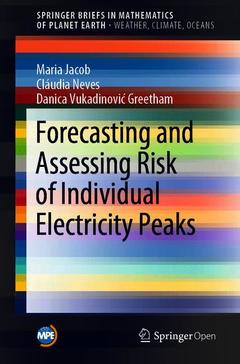Forecasting and Assessing Risk of Individual Electricity Peaks, 1st ed. 2020 SpringerBriefs in Mathematics of Planet Earth Series
Auteurs : Jacob Maria, Neves Cláudia, Vukadinović Greetham Danica

The overarching aim of this open access book is to present self-contained theory and algorithms for investigation and prediction of electric demand peaks. A cross-section of popular demand forecasting algorithms from statistics, machine learning and mathematics is presented, followed by extreme value theory techniques with examples.
In order to achieve carbon targets, good forecasts of peaks are essential. For instance, shifting demand or charging battery depends on correct demand predictions in time. Majority of forecasting algorithms historically were focused on average load prediction. In order to model the peaks, methods from extreme value theory are applied. This allows us to study extremes without making any assumption on the central parts of demand distribution and to predict beyond the range of available data.
While applied on individual loads, the techniques described in this book can be extended naturally to substations, or to commercial settings.Extreme value theory techniques presented can be also used across other disciplines, for example for predicting heavy rainfalls, wind speed, solar radiation and extreme weather events. The book is intended for students, academics, engineers and professionals that are interested in short term load prediction, energy data analytics, battery control, demand side response and data science in general.Preface.- Introduction.- Short Term Load Forecasting.- Extreme Value Theory.- Extreme Value Statistics.- Case Study.- References.- Index.
Maria Jacob completed a masters with the Mathematics of Planet Earth Centre for Doctoral training of University of Reading and Imperial College London. She is interested in using statistics and data science methods particularly within the public sector.
Cláudia Neves is a Lecturer at the University of Reading. For over 10 years, her research in extreme value statistics has been informed as much as driven by a number of applications arising in hydrology (heavy rainfall) demography (supercentenarian’s lifespan), public health, and more recently, in the energy sector (e.g. electricity demand, safety issues in nuclear infrastructure). She has been awarded an EPRSC Innovation Fellowship for the project "Multivariate Max-stable Processes with Application to the Forecasting of Multiple Hazards".
Danica Vukadinović Greetham is Senior Research Fellow at the Open University’s Knowledge Media Institute. Her expertise is in network analysis and optimisationwith background in mathematics (BSc, University of Belgrade) and computer science (PhD, ETHZ) and over 15 years of industrial and academic experience. Her research interests include modelling and predicting human behaviour from big data, and mathematical modelling of low voltage networks.
Date de parution : 10-2019
Ouvrage de 97 p.
15.5x23.5 cm
Thèmes de Forecasting and Assessing Risk of Individual Electricity... :
Mots-clés :
60G70, 05C85, 62M10, 68T05, electricity forecasting, extreme value theory, scedasis, heteroscedasticity, short-term load forecast, error measures, permutation-based algorithms, Block maxima methods in statistics of extremes, individual electricity peaks, risk of individual electricity peaks, forecasting individual electricity peaks, Open Access, end-point estimation, SARIMA models, Long Short Term Memory (LSTM), Multi-layer Perceptron(MLP), permutation merge, permutation-based errors, Open Access



